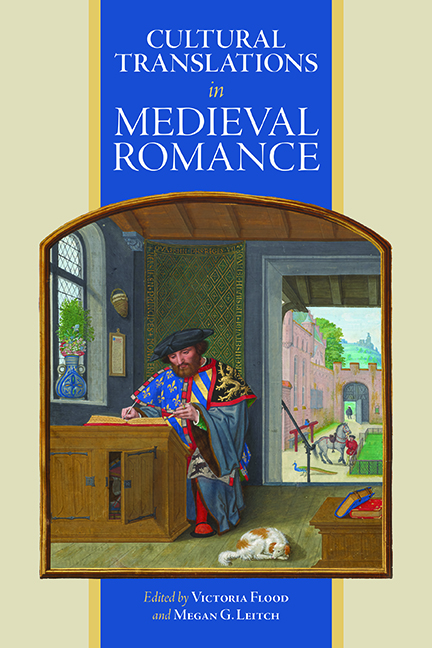Book contents
- Frontmatter
- Contents
- List of Contributors
- List of Abbreviations
- Introduction Insular Romance in Translation: New Approaches
- 1 Romantic Wales: Imagining Wales in Medieval Insular Romance
- 2 ‘Something remains which is not open to my understanding’: Enigmatic Marvels in Welsh Otherworld Narratives and Latin Arthurian Romance
- 3 The Supernatural Company in Cultural Translation: Dafydd ap Gwilym and the Roman de la Rose Tradition
- 4 Women and Werewolves: William of Palerne in Three Cultures
- 5 ‘Better a valiant squire than a cowardly knight’: Gender in Guruns strengleikr (The Lay of Gurun)
- 6 ‘Vinegar upon Nitre’? Walter Map’s Romance of ‘Sadius and Galo’
- 7 The Three Barriers to Closure in Hue de Rotelande’s Ipomedon and the Middle English Translations
- 8 Trojan Trash? The Seege or Batayle of Troye and the Learning of ‘Popular’ Romance
- 9 Poaching Romance: Fan Fiction Theory and Shared Medieval Narratives
- 10 Between Epic and Romance: The Matter of England and the Chansons de Geste
- 11 Geographies of Loss: Cilician Armenia and the Prose Romance of Melusine
- 12 ‘All this will not comfort me’: Romancing the Ballad in The Squire of Low Degree
- 13 Merchants in Shining Armour: Chivalrous Interventions and Social Mobility in Late Middle English Romance
- Index of Manuscripts
- General Index
- Miscellaneous Endmatter
2 - ‘Something remains which is not open to my understanding’: Enigmatic Marvels in Welsh Otherworld Narratives and Latin Arthurian Romance
Published online by Cambridge University Press: 07 October 2022
- Frontmatter
- Contents
- List of Contributors
- List of Abbreviations
- Introduction Insular Romance in Translation: New Approaches
- 1 Romantic Wales: Imagining Wales in Medieval Insular Romance
- 2 ‘Something remains which is not open to my understanding’: Enigmatic Marvels in Welsh Otherworld Narratives and Latin Arthurian Romance
- 3 The Supernatural Company in Cultural Translation: Dafydd ap Gwilym and the Roman de la Rose Tradition
- 4 Women and Werewolves: William of Palerne in Three Cultures
- 5 ‘Better a valiant squire than a cowardly knight’: Gender in Guruns strengleikr (The Lay of Gurun)
- 6 ‘Vinegar upon Nitre’? Walter Map’s Romance of ‘Sadius and Galo’
- 7 The Three Barriers to Closure in Hue de Rotelande’s Ipomedon and the Middle English Translations
- 8 Trojan Trash? The Seege or Batayle of Troye and the Learning of ‘Popular’ Romance
- 9 Poaching Romance: Fan Fiction Theory and Shared Medieval Narratives
- 10 Between Epic and Romance: The Matter of England and the Chansons de Geste
- 11 Geographies of Loss: Cilician Armenia and the Prose Romance of Melusine
- 12 ‘All this will not comfort me’: Romancing the Ballad in The Squire of Low Degree
- 13 Merchants in Shining Armour: Chivalrous Interventions and Social Mobility in Late Middle English Romance
- Index of Manuscripts
- General Index
- Miscellaneous Endmatter
Summary
This chapter concerns a wonder and an enigma. The narrative motif known as the Erroneous Watchman Device is well attested in early Irish sagas and the Welsh Branwen uerch Lyr. Although it has not previously been understood to have a place in medieval Latin literature or the insular romance tradition, in this chapter I suggest that we find it in two Latin narratives of legendary Britain in which the execution of the motif has much in common with the marvels of romance. The Latin texts, De Ortu Waluuanii Nepotis Arturi and Historia Meriadoci Regis Cambrie, are attributed to the same unknown author, writing sometime between the mid-twelfth and thirteenth centuries and demonstrating a keen interest in the legendary past of Britain, and specifically of Wales. The De Ortu Waluuanii, like Branwen uerch Lyr, features a set piece in which a watchman misrecognises an enemy fleet for a marvellous phenomenon. And, like Branwen, the Historia Meriadoci, I argue, deploys riddling language to explore the narrative alchemy that transforms each set of observations into what Branwen terms chwedleu ryued, strange tidings. This chapter offers a reading of the playful workings of this motif in these Latin texts, proposing that the Latin author may well have adapted the motif from Welsh material, perhaps from a version of Branwen itself. Regardless of source, these scenes are a curiosity, indicating that playful and creative adaptation of the Watchman trope translated across languages and extended not only between Welsh and Irish, but into insular Latin.
My broader purpose in this chapter is to consider these examples as instances of a different kind of translation: the movement of riddle forms into narrative, especially romance. While distinct in each literary tradition, enigmatic marvels – that is, mysterious and wondrous phenomena that cue in-text and readerly interpretative efforts much like those required to solve a riddle – are a mainstay of romances and Otherworldly texts, moving across languages and barriers of genre. Such marvels are, moreover, found at the heart of the multilingual Arthurian canon, whether in the falling tower of Vortigern on Snowdon, the enigmatic dreams of Arthur, or the ‘god games’ of the Green Knight. I propose that these passages reward a dual reading practice, alert to how enigmatic cues and riddling rhetorical structures both operate within a text and position that text within a wider multilingual and multi-generic environment. Such a reading practice can give us fresh purchase on the thorny relationship between adjacent wonder-traditions.
- Type
- Chapter
- Information
- Cultural Translations in Medieval Romance , pp. 45 - 64Publisher: Boydell & BrewerPrint publication year: 2022



